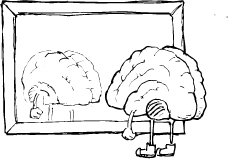
In a previous post this week, I discussed optimism bias and student success in online classes. Optimism bias causes us to paint a rosy picture of the future (even when it’s not likely). But what about when we whitewash the past? I’d like to propose that we call this delusional hindsight. Some of us are able to learn from our past mistakes. Others not so much.
 Let me outline my reasoning. I’ve been reading Generation Me, by Jean Twenge. In this book she suggests that “Generation Me” is particularly good at pushing blame to others because it is the only way to deflect it from hitting their self esteem. If you admit to doing something wrong, then you wouldn’t feel very good about yourself, and Generation Me has been taught that the most important thing in the world is to feel good about themselves (to have high self esteem).
Let me outline my reasoning. I’ve been reading Generation Me, by Jean Twenge. In this book she suggests that “Generation Me” is particularly good at pushing blame to others because it is the only way to deflect it from hitting their self esteem. If you admit to doing something wrong, then you wouldn’t feel very good about yourself, and Generation Me has been taught that the most important thing in the world is to feel good about themselves (to have high self esteem).
Suppose a student signs up for classes late ever semester. Every semester he doesn’t get the classes he needs. Every time the registration date looms, he ignores it, registering late again. It seems to us (the instructors) that this student is unable to remember that his procrastination usually ends badly. However, I no longer think this is an inability to remember, but an inability to causally link Action A (late registration) with Action B (unable to get desired classes). How could the student possibly reason away the self-blame for registering late?
- The reason he didn’t get the desired classes because the college doesn’t offer enough sections or seats.
- He couldn’t register any earlier because he hadn’t made the important decision to go back to school yet, and that was a decision requiring careful consideration, not to be rushed.
- He didn’t want to use financial aid, and was trying to save up enough to pay for the classes himself before registering.
- He didn’t want to trouble a counselor during the “busy season” so he considerately waited to register.
When we were discussing this last weekend, my husband suggested that we call this process of whitewashing the past “delusional hindsight.” This should not be confused with hindsight bias (the tendency to view events as more predictable than they really are).
delusional hindsight: to impose a misleading belief upon the understanding of a situation after it has happened
Just like with optimism bias, I can think of dozens of examples of delusional hindsight in academe. Here are a few (hopefully you can tell which ones apply to students and which ones to professors):
- Signing up for 8am classes, even though you’ve never been able to get up that early.
- Waiting till the last minute to write a paper, even though past experience should tell you it doesn’t work well for you.
- Telling yourself you don’t need an alarm clock despite sleeping through class regularly.
- Telling yourself this will be the semester that you pass fill-in-the-blank-class, even though you haven’t changed anything since the last time.
- Swearing to yourself you won’t take any paper-grading home this semester, even though you’ve sworn this at least five times before.
I think that delusional hindsight and optimism bias go hand-in-hand. Without a retelling of the past, it would be impossible for a student taking Beginning Algebra for the 4th time to even give it an attempt. Can you imagine placing the blame for failure (three times) squarely on your own shoulders and then taking it again? How depressing. Much better for the psyche to place the blame on the textbook, instructor, time of day, difficulty of exams, sick relatives, change in work schedule, etc. With this whitewashing of the past, it is possible to be optimistic about the future.
I think it’s helpful to see these cases of delusional hindsight for what they are. Once you begin to recognize the faulty thinking, it becomes a little easier to cope with student excuses (and our own delusions) that just don’t seem to make sense. We are whitewashing the past for a reason, and that reason is us. The question is, once we know this … what do we do to help us and our students to move past the cycle of delusional hindsight and optimism bias?



